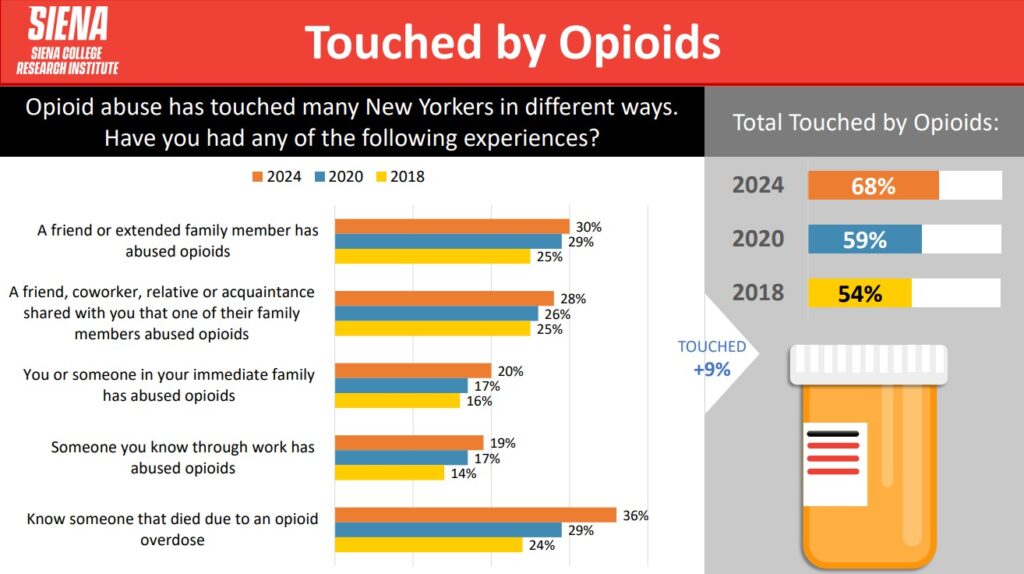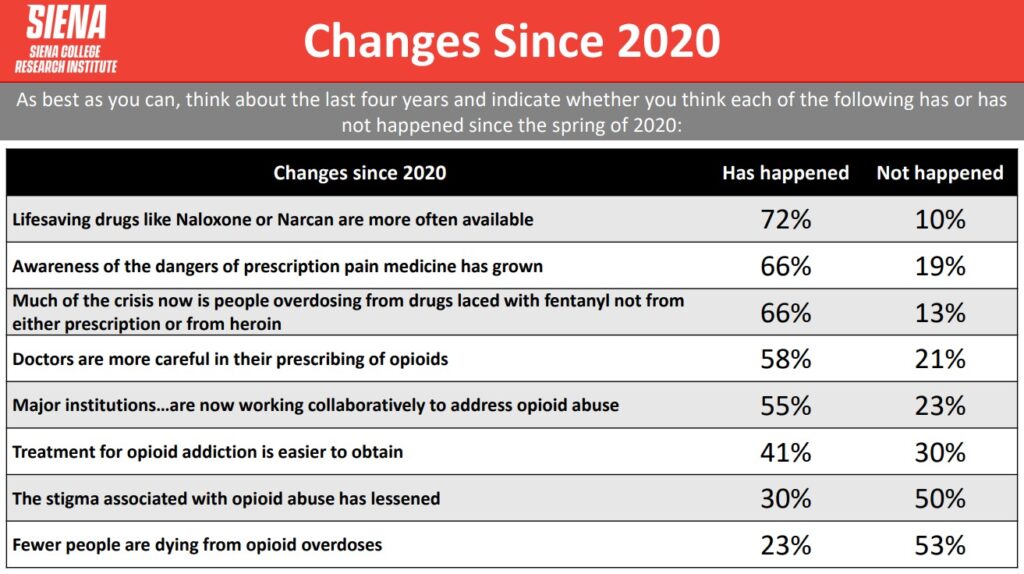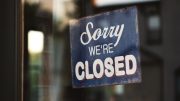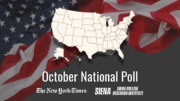- 95% Identify Synthetic Opioids such as Fentanyl as Serious Public Health Issue
- Rate of Pursuing Treatment for Opioid Abuse Nearly Doubles in 4 Years
- Majority say Doctors More Careful in Prescribing Opioids; But, 64% say Government NOT Doing as Much as It Can to Address Opioid Abuse
Loudonville, NY. Sixty-eight percent, or two-in-three New York residents have been touched by opioid abuse, meaning they either know someone in their lives who has abused opioids or personally know someone who has died due to an opioid overdose, according to a recent poll of New Yorkers by the Siena College Research Institute (SCRI). This is an increase from 2020, when 59% had been touched by opioids. Today 72% of state residents say that the problem of opioid abuse has gotten worse in the past few years.
“Majorities across each region of New York State say that opioid abuse is a serious problem in their area, including New York City (81%), the downstate suburbs (68%), upstate (81%) and the Capital Region (79%), and 80% continue to agree that the U.S. is in the middle of an opioid epidemic. Shockingly, one-in-three, 36%, now know someone who has died from an opioid overdose,” said Don Levy, SCRI’s Director.
New Yorkers identify that there has been a shift in the awareness and usage of prescription opioids in the past four years. By a margin of 58-21%, they say that doctors are now more careful in their prescribing of opioids since 2020, and 66% say that the awareness of the dangers of prescription pain medicine has grown. Only 19% of residents in 2024 say that they had been prescribed opioids by a doctor in the previous 2 years, down ten points from 2020. Still, only 23% say that fewer people are dying from opioid overdoses.
The issue of synthetic opioids such as fentanyl has become a dominant focus for New Yorkers in their thinking about the opioid crisis. A plurality, 49 percent, report that when they hear people discussing the ‘Opioid Crisis’, they primarily think of “the abuse of illegal substances including heroin that are laced with synthetic opioids such as fentanyl”, as opposed to prescription opioids (25%) or heroin by itself (18%). Additionally, 95% of New Yorkers say that the growing prevalence of synthetic opioids such as fentanyl is either a ‘very’ (70%) or ‘somewhat’ (25%) serious public health issue.
“Fentanyl has become a serious concern in the minds of New Yorkers all across the state,” Levy said. “Placed in a list with other public health issues such as alcohol abuse, mental illness, obesity, e-cigarette use, or other opioids, ‘the growing prevalence of synthetic opioids such as fentanyl’ rises to the top, with 70% of all NY’ers describing it as ‘very serious.’ Ninety-two percent say that the current crisis is more insidious than other crises as overdosing on opioids including heroin and fentanyl is killing people at previously unheard of rates. Three-quarters of the state support adding fentanyl analogs to New York’s controlled substances list.”
Among those who have been prescribed opioids, 42% report pursuing treatment for opioid abuse, nearly doubled from 23% in 2020. A plurality, 41-30%, of New York residents report that since 2020, treatment for opioid addiction is easier to obtain. This plurality holds for those living in urban and suburban areas, and those with full time employment, but does not for those from rural areas, part-time employment, those who are unemployed, and those who are retired. While many New Yorkers say that treatment is easier to obtain, a significant number report that barriers remain in place for those accessing opioid treatment. They say that insurance refusing coverage for treatment (46%), treatment programs not working with individuals for long enough (44%), and poor follow-up after patients complete treatment (42%) are all barriers to people in their area receiving treatment for opioid abuse – each virtually unchanged from 2020 and 2018.
Over half of New Yorkers, 55%, say that major institutions including hospitals, treatment centers, law enforcement, schools and government entities are now working collaboratively to address opioid abuse. Yet, by 64-36%, they say that governmental entities across New York are not doing as much as they can to address opioid abuse. A majority says that New York’s Office for Addiction Services and Supports is doing only a fair (37%) or poor (22%) job handling the opioid crisis.
“A significant portion of New Yorkers are dissatisfied with the current government response to the opioid crisis,” Levy said, “but when comparing their responses to previous years, large majorities still support, either ‘a great deal’ or ‘some,’ actions such as allocating more funding for treatment and rehabilitation, providing more funding for law enforcement aimed at lessening the availability of illegal opioids, and increasing the severity of sentences for those convicted for trafficking in illegal opioids. While 73% say they favor harm reduction strategies, only 59% support increasing support for needle exchange programs and fewer, 46% support safe injection sites.”
The survey is part of a community effort by Prescription for Progress: United against opioid addiction, a coalition of leaders in healthcare, media, law enforcement, education and business in New York’s Capital Region committed to raising awareness and taking positive steps to address the opioid crisis. To learn more about the Prescription for Progress coalition, including how your organization can participate, please contact Molly Renaud at molly.renaud@timesunion.com.
###
This Siena College Poll was conducted March 29 – May 10, 2024, among 955 NYS Residents drawn from a proprietary online panel (Cint). Interviews conducted online are excluded from the sample and final analysis if they fail any data quality attention check question. Duplicate responses are identified by their response ID and removed from the sample. Three questions were asked of online respondents including a honey-pot question to catch bots and two questions ask the respondent to follow explicit directions. The proprietary panel also incorporates measures that “safeguard against automated bot attacks, deduplication issues, fraudulent VPN usage, and suspicious IP addresses”. Coding of open-ended responses was done by a single human coder. Data from collection modes was weighted to balance sample demographics to match estimates for New York State’s population using data from the Census Bureau’s 2023 U.S. American Community Survey (ACS), on age, region, race/ethnicity, education, and gender to ensure representativeness. The sample was also weighted to match current patterns of party registration using data from the New York State Board of Elections. It has an overall margin of error of +/- 3.2 percentage points including the design effects resulting from weighting. Sampling error is only one of many potential sources of error and there may be other unmeasured error in this or any other public opinion poll. The Siena College Research Institute, directed by Donald Levy, Ph.D., conducts political, economic, social, and cultural research primarily in NYS. SCRI, an independent, non-partisan research institute, subscribes to the American Association of Public Opinion Research Code of Professional Ethics and Practices. For more information, call Don Levy at (518)-783-2901. For survey crosstabs: https://sri.siena.edu/.
Appendices







